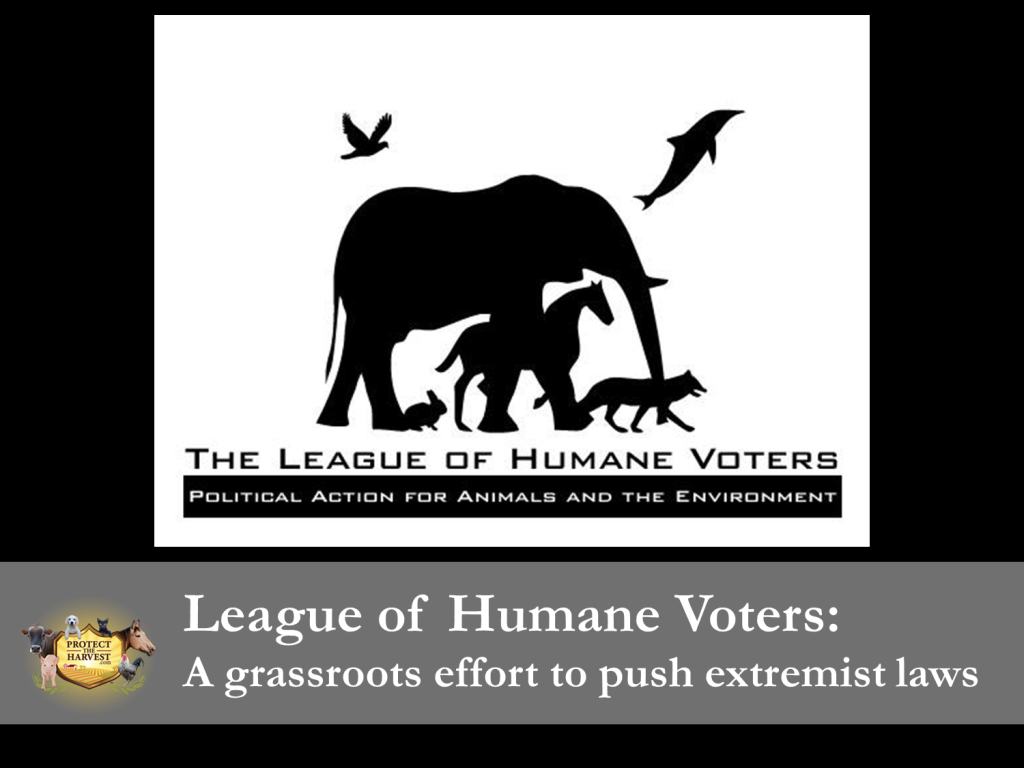LEAGUE OF HUMANE VOTERS: A GRASSROOTS EFFORT TO PUSH EXTREMIST LAWS
By Jaclyn Krymowski for Protect The Harvest
Animal extremist groups leverage the power of political lobbying, emotional appeal, and, perhaps, most important of all, votes to move their agenda forward at local, state, and federal levels. A major way of securing those votes results from swaying public opinion through grassroots efforts and misinformation. It also involves supporting candidates and elected lawmakers who are likely to push animal extremist ideological views forward.
The League of Humane Voters (LOHV) is an extremist group working hard to push its ideology. The group specializes in supporting an extremist animal agenda on the political front. With “humane” in their name, they may seem reasonable to uninformed Americans, however, when one peels back the surface layers the organization projects, below the surface lies an agenda more focused on animal extremism than animal welfare.
Ties to Other Extremist Organizations
The League of Humane Voters is linked to other radical groups in the animal extremist world with a review of their chapter websites revealing connections to the Humane Society of the United States (HSUS), People for the Ethical Treatment of Animals (PETA), Greenpeace, and the Animal Legal Defense Fund (ALDF) to name several. LOHV appears to mirror the same viewpoints and share board members with these and other similar organizations we have discussed previously.
Their Strategy
According to the LOHV website, they:
“…recognize that animal protection requires laws and enforcement. Animal exploitation is a political issue and not just a moral one, and we intend to make animal protection a mainstream political issue by building support among citizens, activists, political parties, candidates and elected representatives.”
They assert LOHV is a group to be trusted because they claim they do not pay their lobbyists:
“LOHV lobbyists are not paid We make appointments with candidates to ask for their support for legislation that protects animals, and for their opposition to legislation that will harm or allow harm to animals to continue.”
Just because they are not paid does not mean they do not work with like-minded extremist groups that leverage large sums of money through their political lobbying.
Pushing Extremist Ideology Nationwide
Taking a grassroots approach, LOHV has chapters in numerous states, each focused on agendas in their own region. Each chapter or “cell” is focused on extremist ideology rather than authentic animal welfare. Each chapter urges members to take direct action and connect with their political representatives on the legislation they have targeted for the year.
Interestingly, the state chapter website pages are careful to portray their cause as endorsing “animal-friendly legislation” and encouraging people to be “animal advocates” and appeal to a wider audience that is unaware of its true extreme agenda. The chapters in New York and Washington provide a glimpse into chapter activities across the country.
New York Chapter
The New York chapter website lists political actions they support. This includes banning raising pheasants for hunting, hunting competition bans, cage-free egg production, rodeo bans, expanding the requirements of “humane animal education” in secondary schools, and more.
In the New York chapter’s 2023 Legislative Agenda and Bills booklet, the first project listed is a “Plant-Based Lunch Option in Public Schools.” The background information provided for this project is filled with questionable statistics and research citing the supposed health benefits of plant-based foods over animal products. As we have previously communicated, vegan and plant-based diets have been proven to be harmful to children. Multiple studies have shown that such diets in children can cause malnutrition and deficiencies.
Washington Chapter
The Washington chapter’s chairperson and founder, Jennifer Hillman, is also HSUS’s vice president of wildlife protection. Her resume includes working for the lobbying and fundraising arm of Greenpeace USA. The chapter’s other leaders have worked with PETA, the Progressive Animal Welfare Society, and the World Elephant Alliance.
The Washington chapter’s website carefully tracks their endorsements of political candidates, as well as collecting donations to “support humane lawmakers.” On their list are court cases targeting conventional livestock farming/ranching, fur farming, and wildlife management.
State Legislation Can Have a National Impact
We have seen the power of deceptive tactics these groups employ at the state level not only in the form of legislation but also with ballot initiatives such as California’s Proposition 12. Animal extremists got a foothold due to state voters who were uninformed when it came to the consequences of the initiative.
Proposition 12 is state law in California, yet it directly impacts other states through interstate commerce by forcing them to comply with their arbitrary standards for animal agriculture. The result has been a years-long, protracted, and expensive legal battle that is now awaiting a decision by the U.S. Supreme Court.
Animal Extremism is Found Everywhere
We have repeatedly seen the power of voters regarding animal issues and food production. Petitions, ballot initiatives, and lobbying are all heavily deployed tools in the extremists’ toolbox. They are used because they often work.
Preying on public perceptions and spreading misinformation is also in the animal extremists’ toolbox because using these tactics sways voters through manipulation. Localized groups such as LOHV serve as funnels to turn those efforts into tangible results.
To protect authentic animal welfare, along with the production of safe and nutritious animal proteins, we must remain vigilant about political efforts from the animal extremist movement.
Being vigilant and understanding their activities from the local to the federal level is essential. The League of Humane Voters – while not as widely known as other extremist groups – should not be dismissed, as their ability to push political agendas has been shown to be effective.



